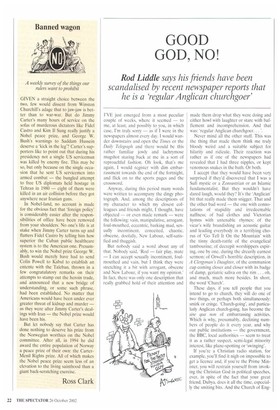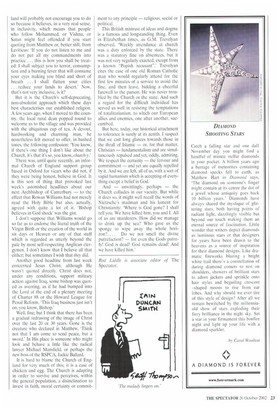GOOD GOD, NO!
Rod Liddle says his friends have been
scandalised by recent newspaper reports that he is a 'regular Anglican churchgoer'
I'VE just emerged from a most peculiar couple of weeks, where it seemed — to me, at least, and possibly to you, in which case, I'm truly sorry — as if I were in the newspapers almost every day. I would wander downstairs and open the Times or the Daily Telegraph and there would be this rather familiar jowly and lachrymose mugshot staring back at me in a sort of reproachful fashion. Oh look, that's me again, I would register with dim embarrassment towards the end of the fortnight, and flick on to the sports pages and the crossword.
Anyway, during this period many words were written to accompany the dingy photograph. And, among the descriptions of my character to which my closest colleagues and friends might, I thought, have objected — or even made remark — were the following: vain, manipulative, arrogant, foul-mouthed, eccentric, barking mad, sexually incontinent, conceited, chaotic, obscene, doolally, New Labour, self-satisfied and thuggish.
But nobody said a word about any of that. Nobody said, 'Rod — fair play, mate — I can accept sexually incontinent, foulmouthed and vain, but I think they were stretching it a bit with arrogant, obscene and New Labour, if you want my opinion.' In fact, there was only one description that really grabbed hold of their attention and made them drop what they were doing and either howl with laughter or stare with bafflement and incomprehension. And that was: 'regular Anglican churchgoer.. .
Never mind all the other stuff. This was the thing that made them think me truly bloody weird and a suitable subject for hilarity and ridicule. Their reaction was rather as if one of the newspapers had revealed that I had three nipples, or kept venomous snakes in the bath. Or both.
I accept that they would have been very surprised if they'd discovered that I was a Sufi mystic or a Zoroastrian or an Islamic fundamentalist. But they wouldn't have dared laugh, would they? It's the 'Anglican' bit that really made them snigger. That and the other bad word — the one with connotations of stupidity and irredeemable naffness; of bad clothes and Victorian hymns with untenable rhymes; of the vicar's wife brandishing an acoustic guitar and leading everybody in a terrifying chorus of 'Go Tell It On the Mountain' with the tinny death-rattle of the evangelical tambourine; of decrepit worshippers expiring, one by one, during the drearily earnest sermon; of Orwell's horrible description, in A Clesymatz's Daughter, of the communion cup coming closer and closer with its badge of damp, geriatric saliva on the rim . . . oh, and much, much more besides. In short, the word 'Church'.
These days, if you tell people that you intend to go to church, they will do one of two things, or perhaps both simultaneously: smirk or cringe. 'Church-going', and particularly Anglican church-going, has become the sine qua non of embarrassing activities. Which is why, presumably, declining numbers of people do it every year, and why our public institutions — the government, the BBC, local authorities — seem to treat it as a rather suspect, semi-legal minority interest, like plane-spotting or 'swinging'.
If you're a Christian radio station, for example, you'll find it nigh on impossible to get a licence and, if you're the Prime Minister, you will restrain yourself from invoking the Christian God in political speeches, ever, in spite of the fact that your great friend, Dubya, does it all the time, especially the smiting bits. And the Church of Eng land will probably not encourage you to do so because it believes, in a very real sense, in inclusivity. which means that people who follow Mohammed. or Vishnu, or Satan might feel offended if you start quoting from Matthew or, better still, from Leviticus: 'If you do not listen to me and do not put all my commandments into practice . . this is how you shall be treated: I shall subject you to terror, consumption and a burning fever that will consume your eyes making you blind and short of breath . I shall flatten your cities . reduce your lands to desert.' Now, that's not very inclusive, is it?
But it is the Church's self-deprecating, non-absolutist approach which these days best characterises our established religion. A few years ago. when I moved to the country, the local rural dean popped round to welcome us to the village and was provided with the ubiquitous cup of tea. A devout, hardworking and charming man, he nonetheless felt moved to offer, in hushed tones, the following confession: 'You know, if there's one thing I don't like about the Church, it's that it's so, you know, church-y.'
There was, until quite recently, an informal Church of England support group based in Oxford for vicars who did not, if they were being honest, believe in God. It is this sort of thing that provoked last week's astonished headlines about our next Archbishop of Canterbury — to the effect that Rowan Williams had not merely read the Holy Bible but also, actually, agreed with quite a lot of it. 'Bishop believes in God shock' was the gist.
I don't suppose that Williams would go so far as to endorse the literal truth of the Virgin Birth or the creation of the world in six days or Heaven or any of that stuff which is regarded as utterly beyond the pale by most self-respecting Anglican clergymen. I don't know that I believe all that either; hut sometimes I wish that they did.
Another good headline from last week concerned Jesus Christ, although He wasn't quoted directly. Christ does not, under any conditions, support military action against Iraq, some bishop was quoted as averring, as if he had bumped into the Lord at the end of a plenary meeting of Charter 88 or the Howard League for Penal Reform. 'This Iraq business just isn't on, you know, Bishop.'
Well, fine; but I think that there has been a gradual redrawing of the image of Christ over the last 20 or 30 years. Gone is the creature who declared in Matthew, 'Think not that I am come to send peace, but a sword.' In His place is someone who might look and behave a little like the radical lawyer Michael Mansfield, or perhaps the new boss of the RSPCA, Jackie Ballard,
It is hard to blame the Church of England for very much of this; it is a case of chicken and egg. The Church is adapting in order to survive and perceives, within the general population, a disinclination to invest in faith, moral certainty or commit
ment to any principle — religious, social or political.
This British mistrust of ideas and dogma is a famous and longstanding thing. Even in Elizabethan times, as G.M. Trevelyan observed, 'Weekly attendance at church was a duty enforced by the state. There was a statutory fine on absentees, but it was not very regularly exacted, except from a known "Popish recusant".' Trevelyan cites the case of one old Roman Catholic man who would regularly attend for the first few minutes of a service to avoid the fine, and then leave, bidding a cheerful farewell to the parson. He was never troubled by the Church or the state. And such a regard for the difficult individual has served us well in resisting the temptations of totalitarianism, to which our European allies and enemies, one after another, succumbed.
But here, today, our historical attachment to tolerance is surely at its zenith. I suspect that we cast long glances towards those in the thrall of Islamic — or, for that matter, Christian — fundamentalism and are simultaneously repulsed and yet, oddly, admiring. We respect the certainty — the fervour and commitment — and yet are equally repelled by it. And we are left, all of us, with a sort of vapid humanism which is accepting of everything except a belief in God.
And — unwittingly, perhaps — the Church colludes in our vacuity. But while it does so, it might well recall the words of Nietzsche's madman and his lament for Christianity: 'Where is God gone? I shall tell you. We have killed him, you and I. All of us are murderers. How did we manage to drink up the sea? Who gave us the sponge to wipe away the whole horizon?. . .. Do we not smell the divine putrefaction? — for even the Gods putrefy! God is dead! God remains dead! And we have killed him.'
Rod Liddle is associate editor of The Spectator.



















































































 Previous page
Previous page